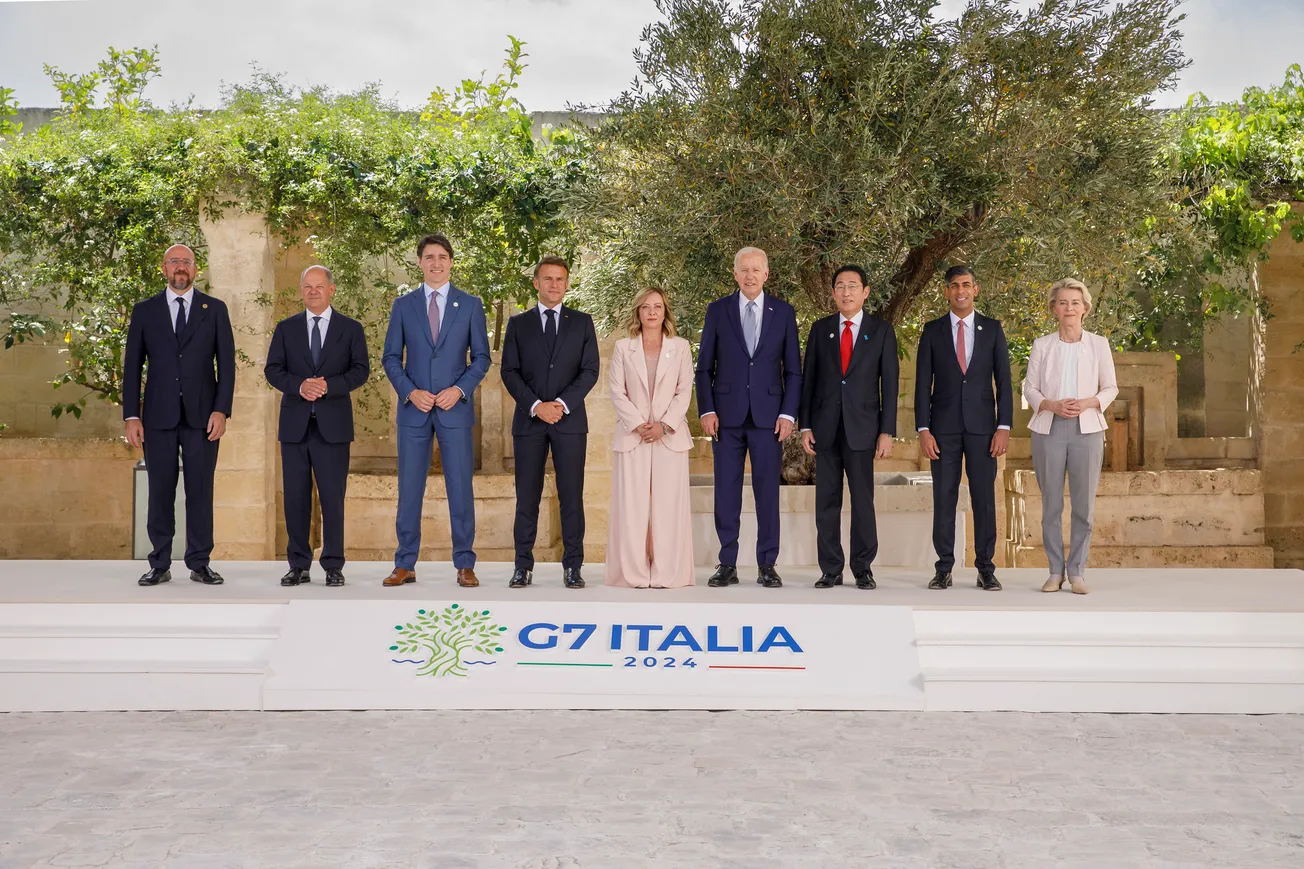The International Peace Coalition (IPC) continued its second year of weekly international online meetings today, with opening comments by Helga Zepp-LaRouche, founder of the Schiller Institute, who reported on the Emergency Press Conference that was held in Washington, D.C. on June 12. She had monitored the responses to the conference, and noted the worldwide concern about the decline of diplomacy, which has been superseded by violence and extortion as instruments of foreign policy.
The G7 Summit in Italy and Related Follies
Even Western media have been completely cynical about the recent G7 meeting, held in a luxury resort in Italy’s southern Puglia region. Except for hosting Prime Minister Giorgia Meloni, every participating head of state was a lame duck of one sort or another. The tone of the meeting was uniformly bellicose, and Zepp-LaRouche presented her assessment of the plan to use the interest on frozen Russian financial holdings to leverage a $50 billion bond to arm Ukraine (because confiscating the entire $300 billion in frozen assets would be the “death knell for the financial system"): “This is obviously very good for the pockets of the military-industrial complex,” she said, but “given the fragility of the financial system, all of these things could trigger reactions which are not part of the calculation.” She discussed the almost surreal nature of how the Western media are covering international relations, such as Volodymyr Zelenskyy’s vaunted “Peace Formula” conference in Switzerland, which excludes Russia and therefore can’t possibly work. “You can see how all the news is being twisted,” she said, and stressed the importance of the June 15-16 Schiller Institute conference.
Advice for Peace Activists
Political analyst Garland Nixon provocatively asserted that, in a sense, nuclear weapons are already in use; he gave the example of the use of depleted uranium rounds, and urged his listeners to “research Fallujah.” He added that similar weapons were sent to Ukraine, but many were apparently blown up in a weapons depot before they could be used. He told the participants that the ruling elites will not respond to reason, so they must be forced by the masses to act. He referred to “the puppet avatars whom they put out, such as Joe Biden.” He recommended to peace activists that they build a long-term infrastructure for activism, because “they’re planning their next conflict…. This is about getting Russia out of the way, so they can get to China.”
Jack Gilroy, a long-time peace activist and member of Pax Christi, described how that organization started in March 1945. He said that the religion of Christianity preaches nonviolence, but regrettably “has become the greatest killer of any religion in the world.” He emphasized the importance of maintaining the intensity of the recent student activism in the U.S., saying that students “may be away from their campuses, but they’re not away from their phones.” He recommended a focus on social media, where there are now 25-30 major platforms. Although there is good work being done on stopping the genocide in Gaza, “even the students are not awake on the issue of nuclear weapons.”
Gilroy provided colorful anecdotes from his life of peace activism. He described life as a school teacher during the 1960s, when people were more conscious of the threat posed by nuclear weapons. His young students who participated in “duck and cover” drills knew that these were nonsensical and were offering no real protection; one of his students became so frightened that she swallowed a bottle of aspirin in the restroom and had to be rushed to the hospital. But in those days, at least there was an open channel of communication between the U.S. and the Soviet Union; today we don’t have the red phone, nor any cultural exchange.
Disillusioned by the U.S. government, Gilroy’s family moved to Australia, where Jack found himself organizing students to protest French nuclear testing in the Pacific. He later resumed his work in the U.S., where Jack was videotaped dressed as Santa Claus, climbing over the fence at an armaments factory with a bag of gifts for defense workers. He concluded by praising the Schiller Institute’s June 12 emergency press conference and urging the widest possible circulation of its press release.
Helga Zepp-LaRouche responded to Garland Nixon by saying that we must convince the people of the U.S. and Europe that the nations of the Global South are our natural allies. If we can work with the BRICS, the Shanghai Cooperation Organization, and related bodies, then there is reason for optimism. She then invited Jack Gilroy to come to Germany and straighten out the wayward Catholics and Protestants there, including many of their top leaders.
During the discussion period, one guest who described himself as a “Simple German” reported that he has become remoralized to learn that he has co-thinkers around the world.
New York independent congressional candidate Jose Vega gave a report on the Nov. 5 elections. He mentioned that in the Bronx congressional district that borders his own, AIPAC is spending over $11 million in an effort to “primary” Rep. Jamaal Bowman. Vega stressed that he is not endorsing Bowman, who is very wrong on Ukraine, but praised him for taking a stand on Gaza. “Nobody should be allowed to just buy a congressional district.” said Vega. “These elections should be decided by voters, not by people who have deep pockets.”
A report came from a German participant who had worked in a senior position for the NATO political affairs division, during which he had participated, beginning in 1979, in the Wintex “crisis management” exercises, which included nuclear war gaming. He reported that each time the scenarios were “gamed,” Europe was always destroyed. He recalled one exercise where an American general was heard to say, “Unfortunately, in the Fulda Gap, the German villages are only half a kiloton away from each other.”
A correspondent for Unity News in the U.K. reported that the mainstream media and government all say that soon there will be conscription there, and British youth will go to Ukraine to fight. She said that the majority of Britons have no idea and think that this is a joke. “As independent media, we find it very difficult to speak outside of our bubble … to get any traction,” she said, and she also praised the June 12 press conference.
IPC co-moderator Dennis Small recommended that everyone watch the 22-minute exchange between Putin and the St. Petersburg International Economic Forum (SPIEF) moderator Sergey Karaganov on the issue of Russia’s nuclear arms policy. He added that the greatest danger is that if nuclear war proceeds, everything beautiful that humanity has created will disappear. He quoted from Nikolai Ostrovsky’s book, How the Steel Was Tempered: “Man’s dearest possession is his life, and since it is given him but once, he must live so as to feel no regrets for years without purpose; so live as not to be with shame of a cowardly and trivial past.”
In her concluding remarks, Helga Zepp-LaRouche underscored the importance of the report given by a German, who had participated in NATO war games in Europe, describing the actual thinking in these nuclear games that Europe does not play a role. “That is absolutely something which people should really come to grips with, because once you realize that you are just a pawn on a chessboard, dispensable to be thrown away, it may alter your servility towards the hegemon.” She added that because nuclear war threatens everyone in the world, “it makes everyone automatically a world citizen.”



